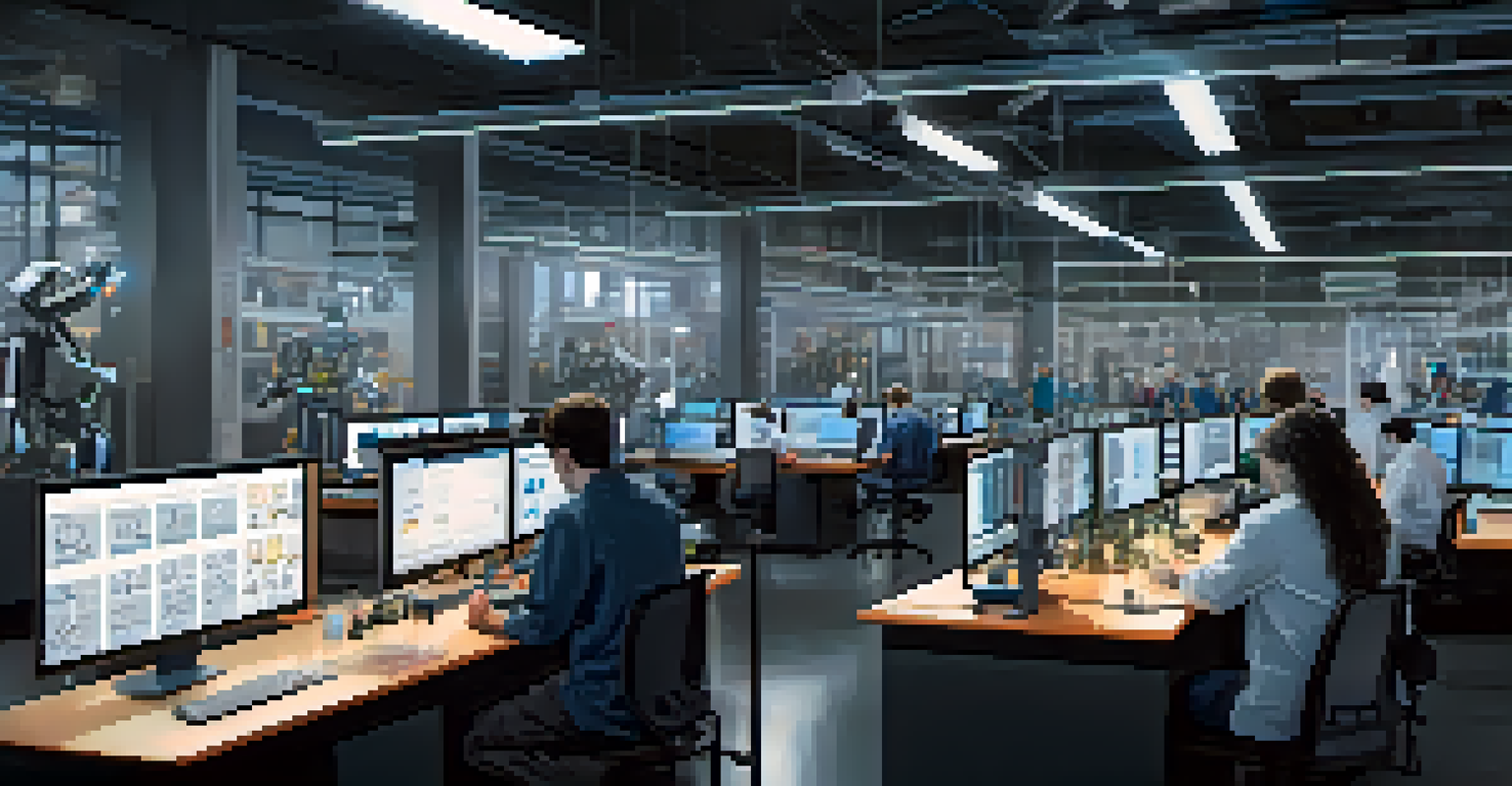Pittsburgh's Tech Revolution: The Rise of Robotics and AI

A Brief History of Pittsburgh's Tech Scene
Pittsburgh has a rich industrial history, known primarily for steel production. However, over the past few decades, it has transformed into a vibrant tech hub. This shift began as universities and startups collaborated to innovate in fields like robotics and artificial intelligence.
The future belongs to those who believe in the beauty of their dreams.
The presence of institutions like Carnegie Mellon University has played a pivotal role in this transformation. They not only produce top-tier talent but also foster research that pushes the boundaries of technology. This synergy between academia and industry has laid the groundwork for Pittsburgh's tech revolution.
Consequently, the city is no longer just a relic of its industrial past but a beacon of modern technological advancement. With a growing number of tech companies setting up shop, Pittsburgh is becoming synonymous with innovation in robotics and AI.
The Role of Carnegie Mellon University in AI Development
Carnegie Mellon University (CMU) stands as a cornerstone of Pittsburgh's tech landscape. Its School of Computer Science is renowned globally, producing groundbreaking research in artificial intelligence. This institution has been instrumental in training a generation of experts who are now leaders in the tech industry.

The Robotics Institute at CMU is particularly noteworthy. It has been at the forefront of robotics research since its founding in 1979, developing technologies that are now integral to various industries. This has created a unique ecosystem where students and researchers can collaborate with local businesses to drive innovation.
Pittsburgh's Tech Transformation
Once known for steel production, Pittsburgh has evolved into a thriving tech hub focused on robotics and AI.
The partnership between CMU and local tech companies fosters a culture of continuous learning and adaptation. As these entities work together, they contribute to a robust pipeline of talent and ideas, ensuring that Pittsburgh remains a key player in the field of AI and robotics.
Key Players in Pittsburgh's Robotics Industry
Pittsburgh is home to numerous influential companies that are shaping the future of robotics. Notable names include Aurora Innovation, which focuses on self-driving technology, and RE2 Robotics, specializing in robotic systems for various applications. These companies are not just local heroes; they are making waves on a national and global scale.
Innovation distinguishes between a leader and a follower.
Another standout is the Advanced Robotics for Manufacturing (ARM) Institute, which bridges the gap between research and industry. ARM collaborates with manufacturers to adopt advanced robotics, enhancing productivity and innovation. This initiative illustrates how Pittsburgh is leveraging its strengths to lead in the robotics space.
Moreover, these companies often engage with local universities for research and development purposes. This collaboration ensures a steady flow of fresh ideas and innovations, keeping Pittsburgh at the cutting edge of robotics technology.
The Impact of AI on Local Industries
Artificial intelligence is not just a buzzword in Pittsburgh; it’s revolutionizing various industries. From healthcare to manufacturing, local businesses are integrating AI technologies to improve efficiency and outcomes. For instance, AI-driven diagnostics in hospitals are transforming patient care and operational efficiency.
The manufacturing sector also benefits significantly from AI applications. Predictive maintenance powered by AI allows companies to anticipate equipment failures, thus reducing downtime and saving costs. This shift is vital for keeping Pittsburgh's manufacturing legacy alive while adapting to modern demands.
Carnegie Mellon Drives Innovation
Carnegie Mellon University plays a crucial role in fostering talent and research that propels Pittsburgh's tech industry.
As AI continues to evolve, the potential for new applications is limitless. Local entrepreneurs and established businesses alike are exploring innovative ways to harness AI, fostering an environment ripe for growth and development.
Challenges Facing Pittsburgh's Tech Sector
Despite the exciting developments in robotics and AI, Pittsburgh's tech sector faces its own set of challenges. One significant hurdle is the competition for talent, as cities like San Francisco and New York often attract top engineers and researchers. This talent drain can hinder growth and innovation in local companies.
Another challenge is securing funding for startups and new ventures. While there is an increasing number of investors looking at Pittsburgh, the level of venture capital still lags behind other tech hubs. This can make it difficult for emerging companies to scale and compete effectively.
To combat these issues, local leaders are focusing on initiatives that promote workforce development and attract investment. By creating a supportive ecosystem, Pittsburgh can continue to nurture its tech talent and maintain its status as a leader in robotics and AI.
The Future of Robotics and AI in Pittsburgh
Looking ahead, the future of robotics and AI in Pittsburgh appears bright. With strong academic institutions, innovative companies, and a supportive community, the city is poised to lead in this technology revolution. As advancements continue, we can expect even more groundbreaking developments to emerge from this hub.
Moreover, the city is actively working on policies that encourage tech growth. Initiatives that support research funding, workforce training, and infrastructure development will be crucial in sustaining this momentum. By investing in these areas, Pittsburgh can solidify its position as a global leader in robotics and artificial intelligence.
AI Revolutionizes Local Industries
Artificial intelligence is enhancing efficiency across various sectors in Pittsburgh, from healthcare to manufacturing.
Ultimately, the blend of talent, innovation, and collaboration is what sets Pittsburgh apart. As the world increasingly relies on AI and robotics, Pittsburgh is ready to rise to the occasion, showcasing the potential of technology to improve lives and drive economic growth.
Community Engagement and Tech Education
Community engagement plays a vital role in Pittsburgh's tech ecosystem. Local organizations and schools are increasingly emphasizing STEM (science, technology, engineering, and mathematics) education. By nurturing interest in these fields from a young age, the city is preparing the next generation of innovators.
Programs like Code.org and local coding boot camps are making technology accessible to all. These initiatives not only teach essential skills but also empower individuals to pursue careers in tech. As more people enter the field, Pittsburgh's tech landscape becomes even richer and more diverse.

Additionally, community events such as hackathons and tech fairs foster collaboration among enthusiasts and professionals alike. These gatherings help to build a supportive network where ideas can flourish, ultimately contributing to Pittsburgh's tech revolution.